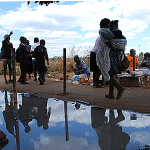
Government and local authorities must be on high alert of the deadly cholera and typhoid outbreak in the country and put preventive and treatment measures in place to avoid deaths. At least four people have so far died from cholera in Chegutu alone while several cases have been reported and treated.
Over 2 400 cases of the lethal typhoid have also been treated across the country in the past four months and that is reason to be very afraid.
Over 4 000 people died from cholera in Zimbabwe in 2008 and a similar tragedy must be avoided at all costs. What is cause of concern is the fact that the disease can be controlled and prevented from spreading through basic means, yet lives continue to be lost. Cholera and typhoid can be prevented and controlled through the provision of clean water, education and making available drugs at clinics and hospitals.
Public education of these diseases is of paramount importance. The Chegutu incident where three people succumbed to cholera recently is a case in point where basic hygiene education would have saved lives.
An 80-year-old woman died from cholera and three of her relatives, following their Moslem religious practice of washing out of the intestines, handled the deceased’s intestines without protection. They contracted the disease and two of them died. During the burial of the two, the same religious ritual was performed resulting in the death of yet another person. Education on the dangers of the cholera bacteria would have saved these precious lives.
The cholera bacteria becomes very difficult and expensive to contain once it is allowed to spread from the point of identification and it is critical that authorities move with speed to fight it as soon as it is identified. The preventive measures require concerted efforts by everyone, especially government, which must pull all stops in ensuring the health delivery system is equipped and ready to deal with this menace.
Cases where doctors begin to toy with the idea of downing tools should be immediately addressed and the lackadaisical approach to screening cross-border human traffic to avoid the importation of the bacteria from current known source areas like Lusaka will not help matters.
Meanwhile, we support the move by government to remove from the streets food vendors whose wares are an easy conduit of life-threatening bacteria. People should understand that we cannot claim to earn a living by engaging in practices that promote disease and death.
- Chamisa under fire over US$120K donation
- Mavhunga puts DeMbare into Chibuku quarterfinals
- Pension funds bet on Cabora Bassa oilfields
- Councils defy govt fire tender directive
Keep Reading
In light of the threat of cholera, typhoid and other related diseases, we welcome the 48-hour ultimatum given to illegal vendors to leave the streets.
In the same vein, the action by legislators last Thursday to force the Finance minister Patrick Chinamasa to raise government public health spending by about one third in the annual budget must be lauded. The MPs threatened to reject Chinamasa’s budget unless he increased the health budget. The minister acceded and revised the allocation from $408 to $520 million. This will definitely give government more room to manoeuvre in dealing with the outbreak of the diseases threatening our lives.











